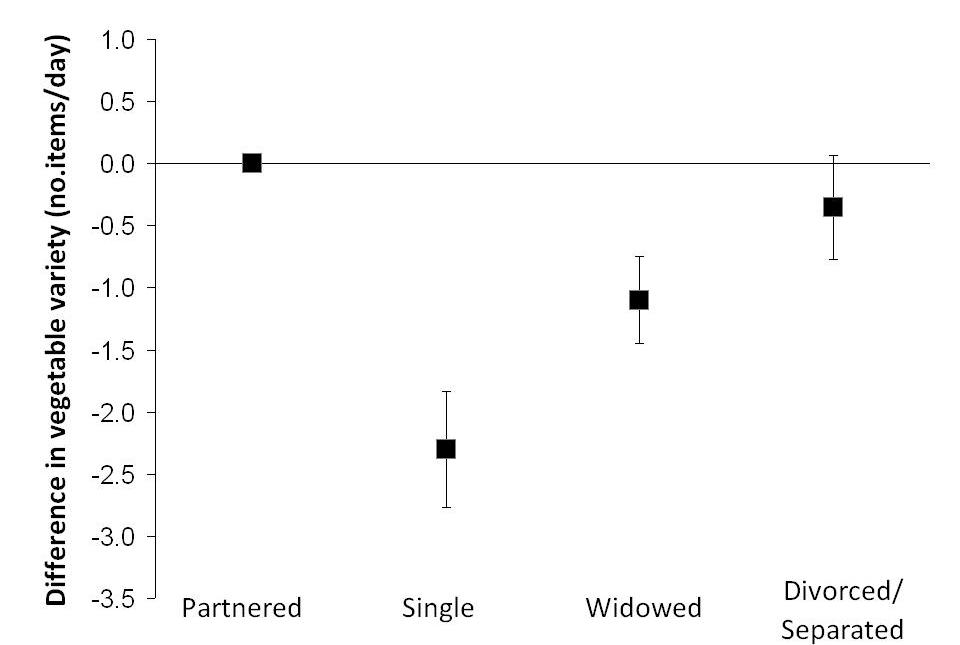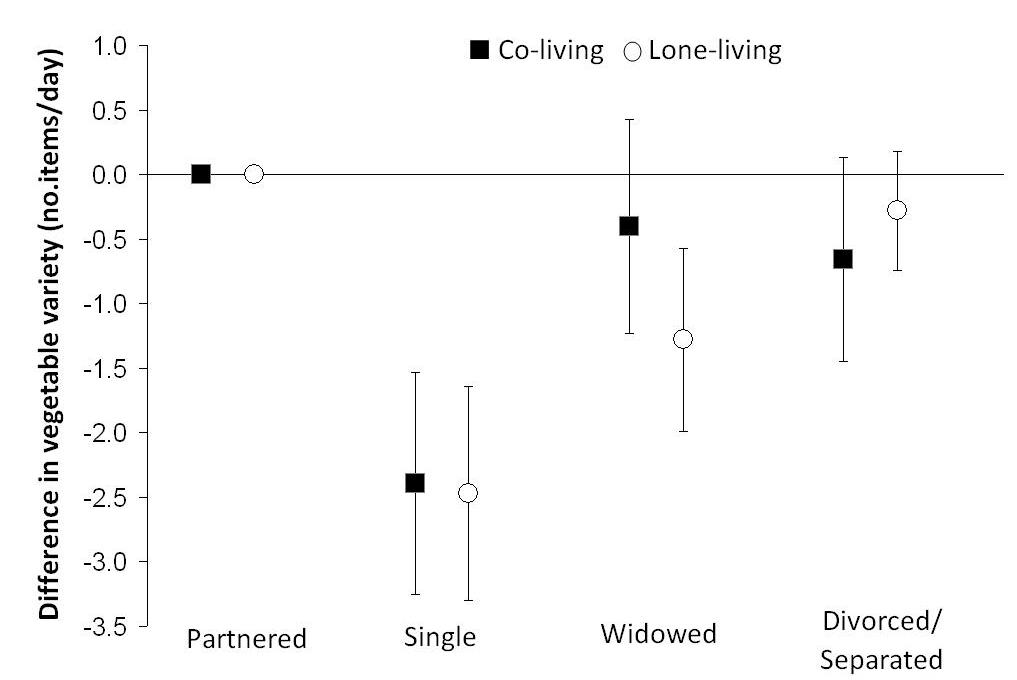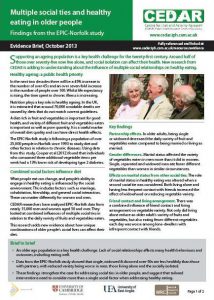Findings from the EPIC-Norfolk study – October 2013
Supporting an ageing population is a key health challenge for the twenty-first century. Around half of those over seventy-five now live alone, and social isolation can affect their health. New research from CEDAR is adding to understanding about the influence of multiple social relationships on healthy eating.
Jump to:
- Healthy ageing: a public health priority
- Combined social factors influence diet
- Key findings
- Worked example
- Policy implications
- References and resources
Brief in brief
- An older age population is a key health challenge. Lack of social relationships affects many health behaviours and outcomes, including eating well.
- Data from the EPIC-Norfolk study showed that single, widowed & divorced over-50s ate less healthily than those with partners, with reduced fruit and veg variety being worse in men, those living alone and the socially isolated.
- These findings strengthen the case for addressing social ties in older people, and suggest that tailored interventions need to consider more than a single social factor when addressing healthy eating.
Healthy ageing: a public health priority
In the next two decades there will be a 45% increase in the number of over-65s and an over seven-fold increase in the number of people over 100 (pdf, p7-8). Whilst life expectancy is rising, the time spent in chronic illness is increasing.
Nutrition plays a key role in healthy ageing. In the UK, it is estimated that around 70,000 avoidable deaths are caused by diets that do not match current guidelines (pdf, p-17).
A diet rich in fruit and vegetables is important for good health, and variety of different fruit and vegetables eaten is important as well as pure quantity. It is a useful marker of overall diet quality and can have direct health effects.
The EPIC-Norfolk study is following a population of over 25,000 people in Norfolk since 1993 to study diet and other factors in relation to chronic diseases. Using data from this study, Cooper et al (2012) found that individuals who consumed three additional vegetable items per week had a 13% lower risk of developing type 2 diabetes.
Combined social factors influence diet
What people eat can change, and people’s ability to engage in healthy eating is influenced by the social environment. This includes factors such as marriage, cohabitation, friendship, and general social interaction. These can matter differently for women and men.
CEDAR researchers have analysed EPIC-Norfolk data from nearly 10,000 men and women aged 50 and over. They looked at combined influences of multiple social ties in relation to the daily variety of fruits and vegetables eaten. This research adds new evidence about how unique combinations of older people’s social lives can affect their diet.
Key findings
Partnership effects. In older adults, being single or widowed decreased the daily variety of fruit and vegetables eaten compared to being married or living as married.
Gender differences. Marital status affected the variety of vegetables eaten in men more than it did in women. Single, separated and widowed men ate fewer different vegetables than women in similar circumstances.
Effects on marital status from other social ties. The role of marital status in healthy eating was altered when a second social tie was considered. Both living alone and having less frequent contact with friends increased the effect of widowhood on reducing vegetable variety.
Friend contact and living arrangement. There was a combined influence of friend contact and living arrangement on vegetable variety. Not only did living alone reduce an older adult’s variety of fruits and vegetables, but also eating fewer different vegetables each day was worse among lone-dwellers with infrequent contact with friends.
How combined social factors interact: a worked example of marital status and living arrangement
Figure 1. Marital status and vegetable variety
Our results confirmed that marital status is an important social relationship influencing diet quality in older people.
- Compared to older adults in a partnership, single over-50s ate 2.3 fewer different vegetable products per day.
- Those who were widowed ate 1.1 fewer different vegetable products daily.

Figure 2. Marital status, living arrangement and vegetable variety
The effect of marital status on vegetable variety changed when we included an older person’s living arrangement:
- Widows and widowers living alone consumed 1.3 fewer different vegetable products daily than married lone-dwellers.
- By contrast, widows and widowers living with someone else ate the same number of different vegetable products each day as over-50s who are in a partnership and live with someone.

This shows that it is not solely widowhood but rather the combination of both widowhood and lone-living that puts older people at risk of a lower quality diet.
Policy implications
- Interventions to increase availability of various social relationships are important for supporting a healthy diet. These could range from organising social activities to considering how the design of accommodation for older people might support interaction.
- Social relationships are complex: when designing interventions for single or widowed older people, it is important to consider tailoring them with respect to other social factors beyond marital status.
- Those over 50 are more likely than other groups in the population to experience changes in their social relationships. These moments of change are important to target in assessment and intervention. For example, around the time of widowhood, assessment of risk to healthy eating needs to consider gender, living arrangement and friend contact.
References and resources
Research
- Social relationships and healthful dietary behaviour: Evidence from over-50s in the EPIC cohort, UK. Conklin, AI et al: doi.org/10.1016/j.socscimed.2013.08.018
- About the EPIC-Norfolk Study: www.epic-norfolk.org.uk
- Fruit and vegetable intake and type 2 diabetes: EPIC-InterAct prospective study and meta-analysis. Cooper et al: www.ncbi.nlm.nih.gov/pmc/articles/PMC3652306/
Policy and guidance
- Keep fit for life: Meeting the nutritional needs of older persons. Geneva: World Health Organization; 2002
www.who.int/nutrition/publications/olderpersons/en/index.html - NHS Choices – Eat well over 60: www.nhs.uk/Livewell/over60s/Pages/Nutritionover60.aspx

 MRC Epidemiology Unit
MRC Epidemiology Unit